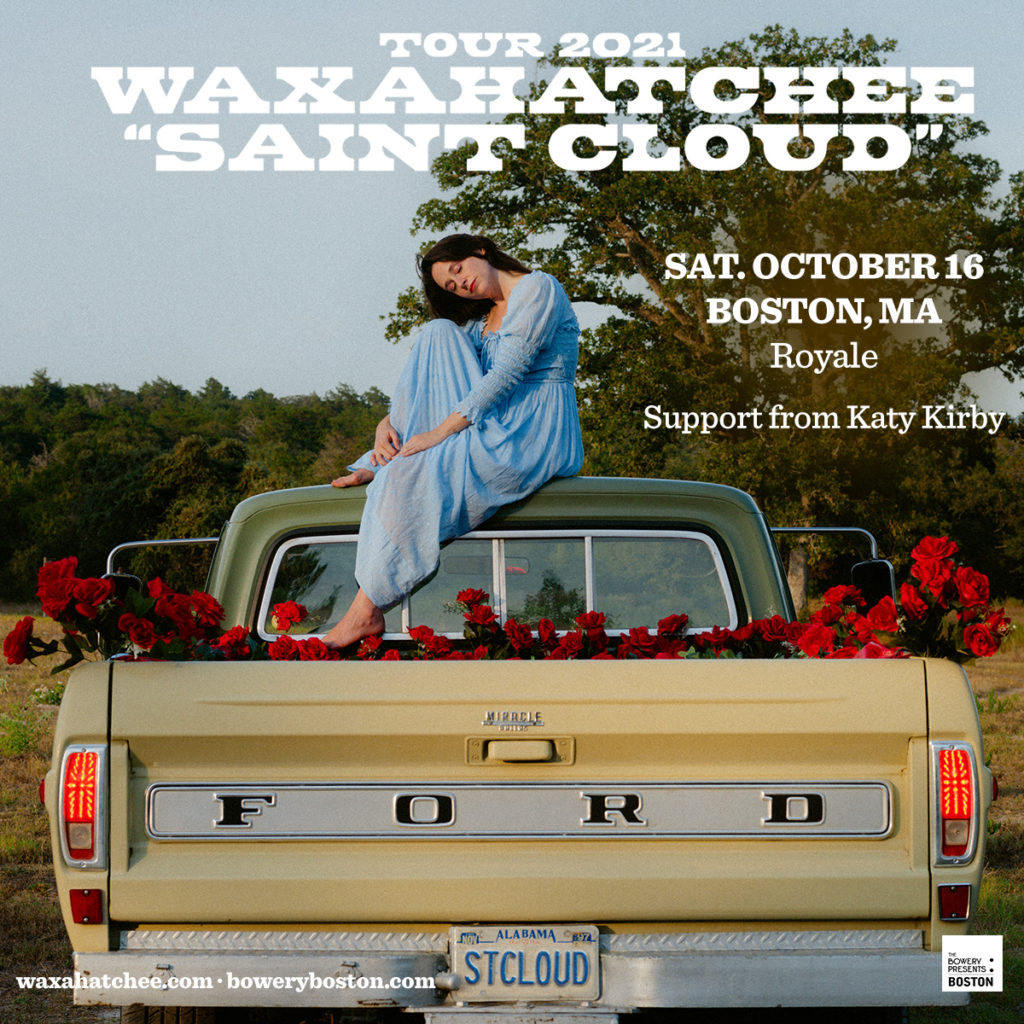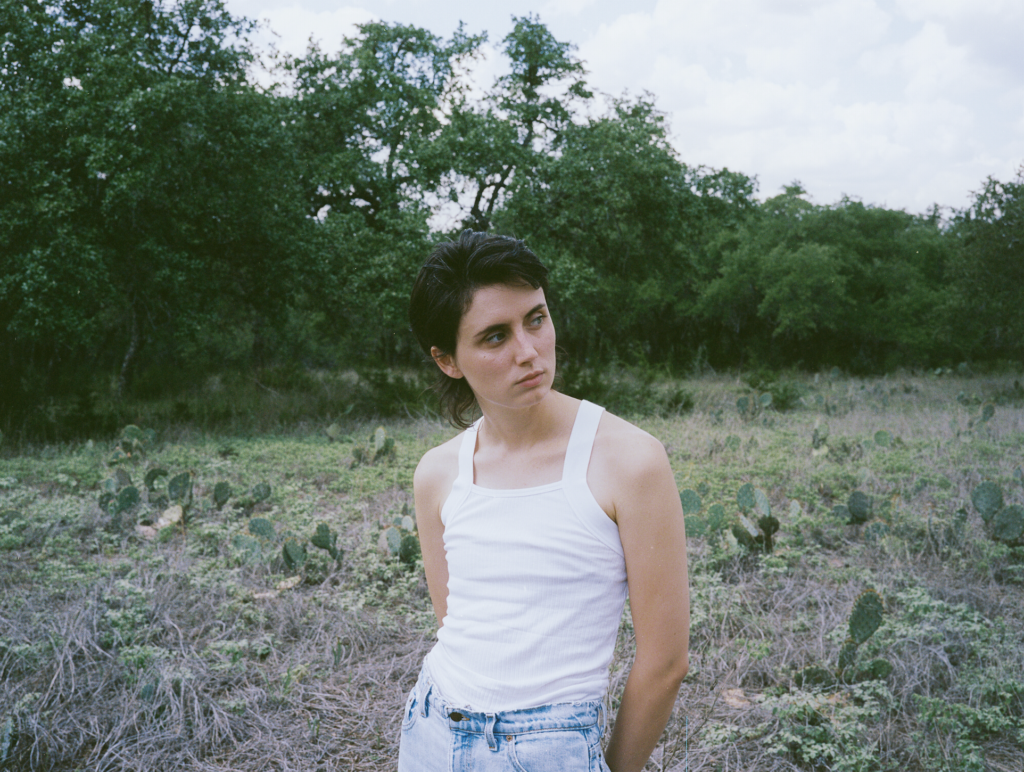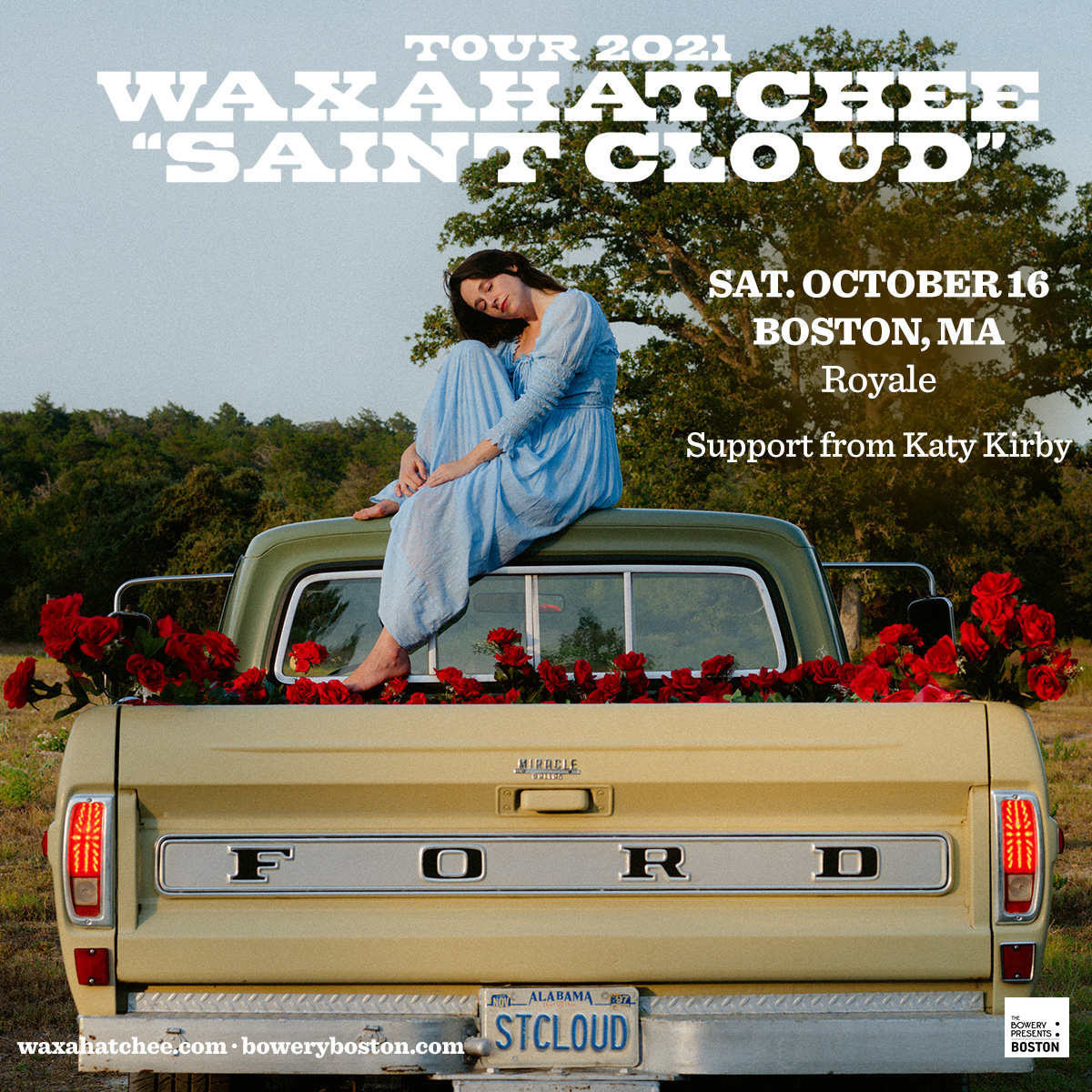Presented by Bowery Boston
Doors: 6:30 pm / Show: 7:00 pm
This show has been postponed to a TBD date. Hang onto your tickets, and we will more info on the rescheduled date soon!
Please Note: All events beginning 10/1/2021 will require attendees to show evidence of their full vaccination against COVID-19. Full vaccination means 14 days or more have passed since the attendee has received a single-dose vaccine or the second dose in a two-dose series. Acceptable vaccination documentation may be a physical copy of a COVID-19 Vaccination Record Card, a digital copy of such card or such other proof as is permitted locally. The City of Boston Public Health Commission is requiring all attendees to wear a mask while indoors in a public setting. In addition to the above, please check https://royaleboston.com/policy-faq/ for information on any local rules or restrictions.
Age Limit: This show is 18+ with valid ID. Patrons under 18 admitted if accompanied by a parent.
Opening acts and set times are subject to change without notice. All bags larger than 12 inches x 12 inches, backpacks, professional cameras, video equipment, large bags, luggage and like articles are strictly prohibited from the venue. Please make sure necessary arrangements are made ahead of time. All patrons subject to search upon venue entry.
***

***
Waxahatchee

What do we hold on to from our past? What must we let go of to truly move forward?
Waxahatchee’s Katie Crutchfield, a lyricist who has always let her listeners know exactly where she is at a given moment, spent much of 2018 reckoning with these questions and revisiting her roots to look for answers. The result is Saint Cloud, an intimate journey through the places she’s been, filled with the people she’s loved.
Written immediately in the period following her decision to get sober, the album is an unflinching self-examination. From a moment of reckoning in Barcelona to a tourist trap in Tennessee to a painful confrontation on Arkadelphia Road, from a nostalgic jaunt down 7th Street in New York City to the Mississippi Gulf, Crutchfield creates a sense of place for her soul-baring tales, a longtime staple of her storytelling.
This raw, exposed narrative terrain is aided by a shift in sonic arrangements as well. While her last two records featured the kind of big guitars, well-honed noise, and battering sounds that characterized her Philadelphia scene and strongly influenced a burgeoning new class of singer-songwriters, Saint Cloud strips back those layers to create space for Crutchfield’s voice and lyrics. The result is a classic Americana sound with modern touches befitting an artist who has emerged as one of the signature storytellers of her time.
From the origins of her band name—the beloved creek behind her childhood home—to scene-setting classics like “Noccalula” and “Sparks Fly,” listening to Waxahatchee has always felt like being invited along on a journey with a steely-eyed navigator. On Saint Cloud, Crutchfield adds a new sense of perspective to her travels. Reflecting on this, she says, “I think all of my records are turbulent and emotional, but this one feels like it has a little dose of enlightenment. It feels a little more calm and less reckless.”
Many of the narratives on Saint Cloud concern addiction and the havoc it wreaks on ourselves and our loved ones, as Crutchfield comes to a deeper understanding of love not only for those around her but for herself. This coalesces most clearly on “Fire,” which she says was literally written in transit, during a drive over the Mississippi River into West Memphis, and serves as a love song to herself, a paean to moving past shame into a place of unconditional self-acceptance. Coming from a songwriter long accustomed to looking in other directions for love, it’s a stirring moment when Crutchfield sings, “I take it for granted/If I could love you unconditionally/I could iron out the edges of the darkest sky.”
Which is not to say that Saint Cloud lacks Crutchfield’s signature poetry on matters of romantic love. Still, her personal evolution in this area is evident too, as this time around, Crutchfield examines what it really means to be with someone and how it feels to see our own patterns more clearly. On “Hell,” she sings: “I hover above like a deity/But you don’t worship me, you don’t worship me/You strip the illusion, you did it well/I’ll put you through hell.”
Crutchfield also looks at what it’s like to be romantically involved with another artist, someone in search of their own truth, on “The Eye”: “Our feet don’t ever touch the ground/Run ourselves ragged town to town/Chasing uncertainty around, a siren sound” and “We leave love behind without a tear or a long goodbye/as we wait for lightning to strike/We are enthralled by the calling of the eye.”
And of course, even when Crutchfield is taking a more nuanced approach to love, her ease with all-encompassing sentiments is still clear, with lines like “I give it to you all on a dime/I love you till the day I die” which sound culled from a classic torch song.
Over the course of Saint Cloud’s 11 songs, which were recorded in the summer of 2019 at Sonic Ranch in Tornillo, TX, and Long Pond in Stuyvesant, NY, and produced by Brad Cook (Bon Iver, Big Red Machine), Crutchfield peels back the distortion of electric guitars to create a wider sonic palette than on any previous Waxahatchee album. It is a record filled with nods to classic country (like the honky tonk ease of “Can’t Do Much”), folk-inspired tones (heard in the confessional lilt of “St. Cloud”), and distinctly modern touches (like the pulsating minimalism of “Fire”).
To bolster her vision, Crutchfield enlisted Bobby Colombo and Bill Lennox, both of the Detroit-based band Bonny Doon, to serve as her backing band on the record, along with Josh Kaufman (Hiss Golden Messenger, Bonny Light Horseman) on guitar and keyboards and Nick Kinsey (Kevin Morby, Elvis Perkins) on drums and percussion. Bonny Doon will also perform as Crutchfield’s live band during her extensive tours planned for 2020, which include the US and Europe.
Saint Cloud marks the beginning of a journey for Crutchfield, one that sees her leaving behind past vices and the comfortable environs of her Philadelphia scene to head south in search of something new. If on her previous work Crutchfield was out in the storm, she’s now firmly in the eye of it, taking stock of her past with a clear perspective and gathering the strength to carry onward.
*****************************************************************************************
Saint Cloud was released on March 27th, 2020 on Merge Records.
***
Katy Kirby

Katy Kirby is a songwriter and indie rock practitioner with an affinity for unspoken rules, misunderstanding, and boredom. She was born, raised, and homeschooled by two ex-cheerleaders in small-town Texas and started singing in church, amidst the pasteurized-pop choruses of evangelical worship, about which she shares acute perceptions.
Like many bible belt late-millennials, Katy grew up on a strict diet of this dependably uncool genre. She recalls, “In the mid-90s, the American evangelical church was making music of an extraordinarily digestible, almost unprecedentedly easy-listening kind, stylistically void and vaguely dubbed Christian Contemporary Music, or CCM. It was pop that wasn’t quite pop, determinedly hanging on to the openhearted melodies of a decade prior, straightforward so as to be easily memorable, and in a key that an average churchgoer could sing along to.”
Accordingly, Cool Dry Place finds her dismantling it. “I can hear myself negotiating with that worship-ish music, fighting that deeply internalized impulse to make things that are super pleasant or approachable.” She hasn’t fully overcome the itch to please, but to a listener’s benefit. Instead of eradicating the pop sensibilities of her past, she warps them, lacing sugary hooks with sneaky, virulent rage, twisting affectionate tones into matter-of-fact reproach, and planting seemingly serene melodies with sonic jabs. The fun is in the clash.
Take “Portals” for example, a song of country-traditional chords and gentle vocal delivery that might have easily materialized as a placid ballad. Rather, Katy drenched its soft core in metallic noise and oscillating string textures. You can imagine someone bussing glassware from a table nearby, while Katy sits you down at a booth and trusts you with notes on a pre-breakup, the first couple of minutes living in the last part of a relationship.
With the same masterful trickery, “Traffic!” juxtaposes sound and sentiment, a jittery combination of saturated pop and Rainforest Cafe’ faux-tropicalia projecting (arguably false) sympathy toward a character absorbed in his own self-inflicted misery. Though her chorus wails jubilant, Katy weaponizes its catchy gusts to criticize privilege: “Nobody has it better than you.”
Katy’s residual ties to church life are audial alone; spiritually, she has worked to detach. “Until a couple of years ago, I spent much of my time falling out of love with God. My life until then hadn’t just been participating in a church so much as completely, profoundly believing—youth group, sure, but also a few attempts to cast out demons. Learning how to think or see things outside of that very intense, clarified space was like rewiring my brain. I guess that if there’s one thing that unifies these songs, it’s that they’re figuring out what to do, or how to love, or who to rely on outside of that context.”
The nine tracks that make up Cool Dry Place are miscellaneous in subject (motherhood, late capitalism, disintegrating relationships,) but unified by the angle from which they’re told, from a person re-learning to process life with intense attention. Each song is a catalog of fragments, the number of segments in an orange or the cut of an obsessively-worn shirt, distilled into meditations on the bizarre and microscopic exchanges that make up modern life — a relationship splintering, an uncomfortable pause, an understanding finally found. These emotional dioramas are moderated by the angular storytelling that unites Gillian Welch and Phoebe Bridgers, a favor for the conventions of short fiction over confession.
Kirby readily admits that Cool Dry Place feels like a late-bloomer’s record. “These songs were written and recorded over an embarrassingly long period of time, by a few different versions of myself.” The album began in Nashville years ago. Kirby had moved there for college, changed majors five times, briefly dropped out, and finally graduated with a handful of songs, a circle of artistic allies, an amorphous collection of leftist beliefs, and an English degree. She flailed in the solo-artist archetype for a period of time before turning to friends capable of constructing a satisfying full length. Kirby, Alberto, Hunt, Logan, and Zook spent over a year carving out bits of spare time to record in bedroom studios, living rooms, and a now-demolished former residence of Keith Urban. Tracking was finally completed over Thanksgiving 2019 at Kirby’s childhood home outside of Austin.
As its title track flips the advisory on a package of Tylenol into a hymn to human need for protection and acceptance, Cool Dry Place asks a listener to embrace the precious and contradictory nature of being a person. Katy Kirby is an artist simultaneously tender and angry, vulnerable and protected, calculated and resigned.



